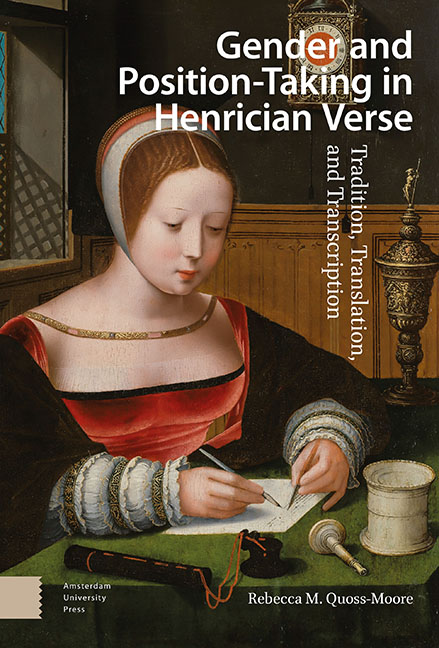Book contents
- Frontmatter
- Table of Contents
- Acknowledgements
- Introduction
- 1 Early Verse Position-Taking in the Henrician Court
- 2 Traditions of Resistance and Verse Position-Taking
- 3 Translation and the Position-Taking Verse Tradition
- 4 Men’s and Women’s Approaches to Translation and Authority in the Late Henrician Court
- 5 Transcription as Translation: Writing the Language of Manuscript Poetry
- 6 Resistance and Unity in the Douglas-Howard Exchange
- Conclusion
- Bibliography
- Index
6 - Resistance and Unity in the Douglas-Howard Exchange
Published online by Cambridge University Press: 13 February 2024
- Frontmatter
- Table of Contents
- Acknowledgements
- Introduction
- 1 Early Verse Position-Taking in the Henrician Court
- 2 Traditions of Resistance and Verse Position-Taking
- 3 Translation and the Position-Taking Verse Tradition
- 4 Men’s and Women’s Approaches to Translation and Authority in the Late Henrician Court
- 5 Transcription as Translation: Writing the Language of Manuscript Poetry
- 6 Resistance and Unity in the Douglas-Howard Exchange
- Conclusion
- Bibliography
- Index
Summary
Abstract: This chapter considers strategies of transcription and dialogue within manuscript creation, focusing on the exchange between Margaret Douglas and Thomas Howard in the Devonshire alongside other sections of the manuscript preserving exchanges wherein writers respond to and riff on one another’s works. The widespread use of such strategies emphasizes the literacies involved in the use of poetry at court; those particular literacies must be established for position-taking verse to circulate successfully via context-dependent codes. The established context of and comparison to translation and tradition allows for greater insight into exactly what transcription offered its authors, while also structuring a framework for considering how and why these three strategies intersected in courtiers’ versified position-taking.
Keywords: Henrician poetry; Tudor verse transcription; Margaret Douglas; Mary Shelton; Devonshire Manuscript; early modern women’s Writing
The previous chapter establishes some of the practices used, particularly by women writers, to express and preserve position-taking verse in the Devonshire Manuscript; earlier sections have established the broader system of which this position-taking was a part. Now, we return to the exchange and the incident with which this work opens: the Douglas-Howard exchange. This incident provides a distillation of the paranoia and anxiety caused by the shifts that occurred under Henry VIII’s reign: the increasing centralization of power and the increasing surveillance associated with the drive to protect that power. In response, both Douglas and Howard, or at least the voices apparently assigned to them in the Devonshire, use elements of the same performances imposed on them by this surveillance culture to express their resentment and resistance. Using the same gender and hierarchical roles that Henry himself had partially defined, Douglas and Howard define the legitimacy of their relationship and express the necessity of its primacy and privilege even in the face of official opposition. Using the rules of courtly love, Douglas and Howard both lay claim to an older and earlier system of fidelity. As David R. Carlson summarizes, Henrician court poetry ‘concerns itself with what it meant at the moment to be a courtier’ and with, more specifically, ‘the loss of the fundamental aristocratic prerogative’.
- Type
- Chapter
- Information
- Gender and Position-Taking in Henrician VerseTradition, Translation, and Transcription, pp. 201 - 234Publisher: Amsterdam University PressPrint publication year: 2023



